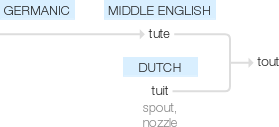Tout
Middle English tute ‘look out’, of Germanic origin; related to Dutch tuit ‘spout, nozzle’. Later senses were ‘watch, spy on’ (late 17th century) and ‘solicit custom’ (mid 18th century). The noun was first recorded (early 18th century) in the slang use ‘thieves' lookout’.
wiktionary
From a dialectal form of toot(“to stick out; project; peer out; peep”), itself from Middle English toten, totien, from Old English tōtian(“to peep out; look; pry; spectate”). Merged with Middle English touten(“to jut out, protrude, gaze upon, observe, peer”), from Old English *tūtian, related to Old English tȳtan(“to stand out, be conspicuous, shine”). Compare Icelandic túta(“a teat-like prominence”), tútna(“to be blown up”).
Probably from French tout(“all”).
etymonline
tout (v.)
1700, thieves' cant, "to act as a lookout, spy on," from Middle English tuten "to peep, peer," probably from a variant of Old English totian "to stick out, peep, peer," from Proto-Germanic *tut- "project" (source also of Dutch tuit "sprout, snout," Middle Dutch tute "nipple, pap," Middle Low German tute "horn, funnel," Old Norse tota "teat, toe of a shoe"). The sense developed to "look out for jobs, votes, customers, etc., to try to get them" (1731), then "praise highly in an attempt to sell" (1920). Related: Touted; touting.
